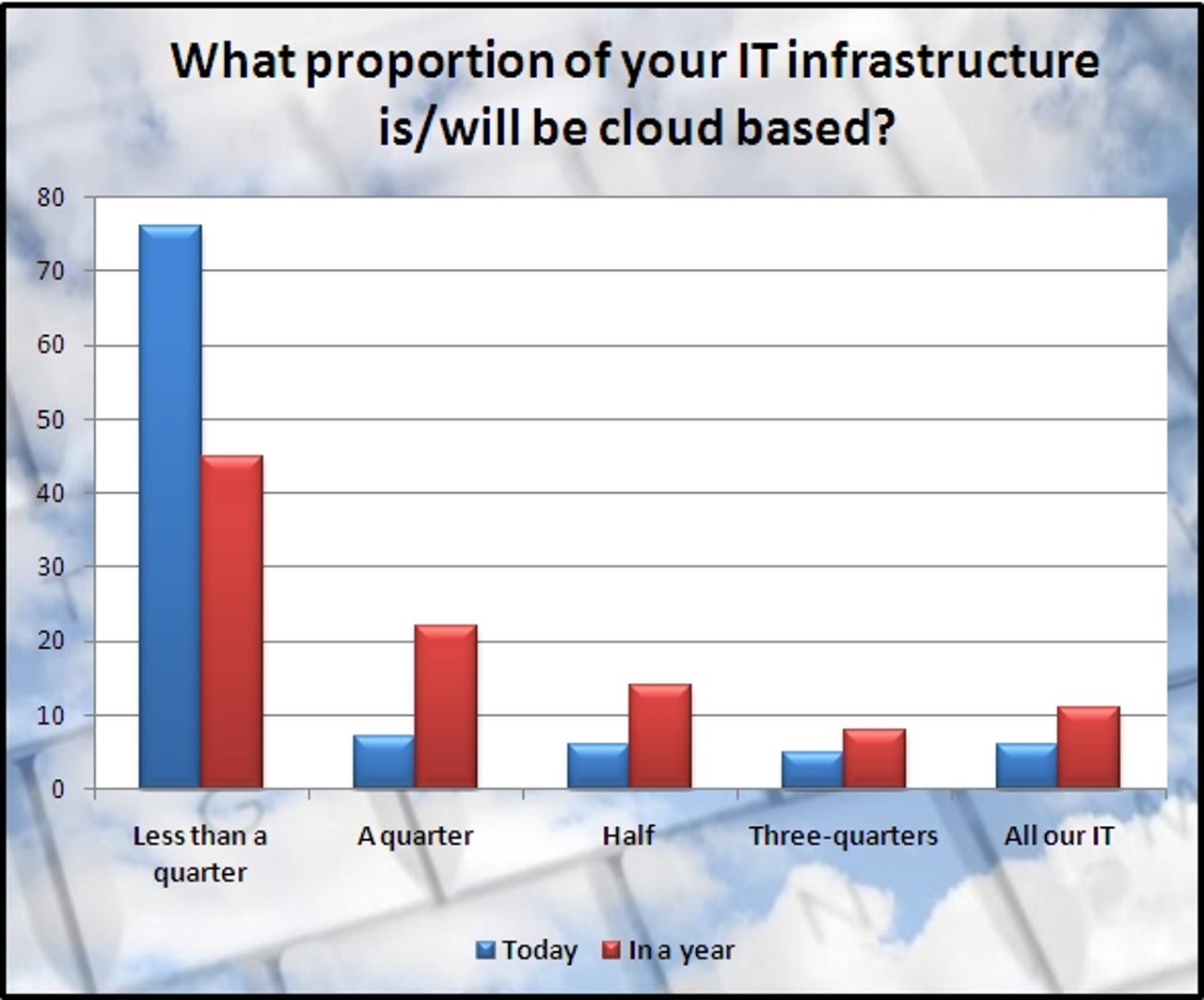Cloud computing: 2011 could be a breakthrough year

IT decision-makers reveal their true thoughts on the cloud...
The use of cloud computing technologies is likely to increase significantly over the next 12 months, with software as a service (SaaS) the type of cloud technology most likely to be adopted.
Exclusive research by silicon.com has revealed that organisations intend to step up their use of cloud services in the coming year. The research also shines a light on why cloud will make a difference to business - and what fears are holding back cloud adoption.
To date, uptake of cloud services has been left mostly to early adopters, with most respondents to the silicon.com cloud research, 76 per cent, saying their organisation has less than one quarter of its infrastructure in the cloud.
But businesses are preparing to scale up their use of cloud computing, with the proportion of respondents whose organisations have a quarter of their IT infrastructure in the cloud tripling over the coming year. One in 10 respondents even predicted that the entire organisation's IT would be in the cloud in a year's time.

What proportion of your IT infrastructure is or will be cloud-based?Source: silicon.com
Anthony Miller, managing partner at analyst house TechMarketView, said businesses are adopting cloud computing as a way of being able to avoid investing in new computer equipment - and of only paying for the IT they use. "The economic downturn has put even more pressure on organisations to reduce IT running costs and transfer capital cost into operating cost," he told silicon.com.
Miller said the cloud also offers organisations the convenience of not having to buy their own kit. "If the organisation wants to start a new project in a month's time, then cloud computing gives them the kit to run it," he said.
Respondents to the silicon.com research seem to share Miller's assessments of the benefits of moving to the cloud, ranking "adding capacity on demand" and "cutting IT costs" as their top reasons for making the move, along with gaining the use of technology that had previously been inaccessible.
What are the biggest benefits of cloud computing to your business?Image: silicon.com
Cloud computing is a broad term that encompasses a number of different technologies. SaaS is by the far the most popular type of cloud computing, with 39 per cent of respondents using it today and 48 per cent expecting to do so in a year's time.
Infrastructure as a service (IaaS), the practice of accessing storage or compute power on demand, is also expected to...
...experience the fastest growth by some analysts.
Bob Tarzey, a director at analyst house Quocirca, said: "At the infrastructure-as-a-service level, cloud computing provides a cheaper and more pragmatic way to buy infrastructure."
There is expected to be a modest increase in the use of private cloud, where internal datacentres are virtualised and automated to serve the organisation on demand, although most respondents said their organisation is not planning to go down this route.
That position puts respondents to the survey potentially at odds with their IT chiefs. Earlier this year, tech leaders on silicon.com's CIO Jury confirmed by a margin of 11 to one that they were looking at introducing private cloud into their IT infrastructure. Nevertheless, many industry experts see private cloud as an intermediate step, a way of virtualising an existing IT infrastructure before moving further into cloud usage.
However, for all the excitement, it is still early days. The low rate of adoption of cloud computing among businesses today is evident in the breakdown of cloud use, with close to a third of respondents saying they use no forms of cloud computing at present, and just over a quarter saying they will not be using cloud computing in a year's time.
Which types of cloud is or will your business be using?Image: silicon.com
Unsurprisingly, security and reliability top the list of concerns stopping respondents from shifting to cloud computing, with respondents concerned about what happens to cloud services if internet infrastructure goes down. However analysts feel the problems of security and reliability can be overstated.
TechMarketView's Miller said if data is being held in the public cloud, security is a concern but the levels of security that most cloud providers offer "is much greater than most organisations have internally".
When it comes to reliability, Tarzey said recent events such as the Amazon EC2 outage are a poor advert for cloud computing but it's hard to make a fair comparison between cloud and inhouse reliability.
"Recent developments, like the Amazon EC2 outage, don't help but it only gets reported because it's Amazon. For example, when private infrastructure goes down, it doesn't get in the news," he said.
What are your biggest concerns about cloud computing?Image: silicon.com
The research was compiled from 100 responses to silicon.com's cloud computing savvy quiz.